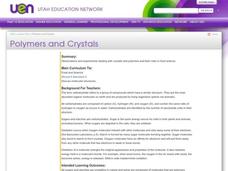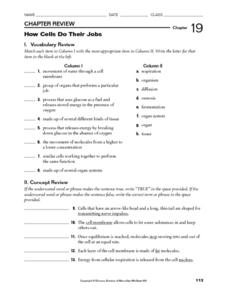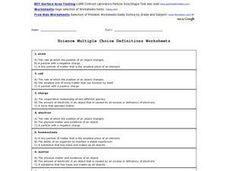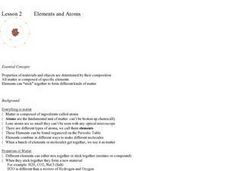Curated OER
Murder and a Meal
In this murder and a meal worksheet, students read the given scenario and determine a procedure to test each organic macromolecule stated in the reading. Students write out the procedure for testing. Students complete a chart that...
Curated OER
Sweet Science: How Sugar Molecules are Manipulated in Candy Making
Students investigate how heat affect sugar solutions. In this science lesson, students compare the sweetness of different types of sugars. They research the development of sugar and create a timeline.
Curated OER
Controlling the Code: Molecules at Word
Students investigate how cells determine which genes will be expressed and which will be silent. In this genetics lesson, students use on-line resources to complete a worksheet and gather information about gene regulation. Lesson...
Curated OER
Life on the Ocean Floor
Why would water 2700 meters deep suddenly become warmer? Explore this and other ocean floor discoveries through this reading response worksheet. Scholars read information about the organisms discovered by Alvin, a deep-sea submersible....
Curated OER
Atoms, Elements, Molecules, and Compounds
In this elements worksheet, students review the Bohr model and define negative and positive subatomic particles. Students compare molecules and compounds. This worksheet has 11 short answer questions and 4 problems to solve.
Curated OER
Chromosomes
Pupils study chromosomes and how molecular half life affects them. In this chromosome lesson students complete several lab activities on calculating half life, and cracking alkanes.
Curated OER
Constructing a Phylogenetic Tree
Students are given the opportunity to analyze DNA sequence differences between organisms in order to establish a reasonable picture of the evolutionary relationships between them (Phylogenetic Tree). In the simulation form they are...
Curated OER
Polymers and Crystals: Their Role in Food Science
Blend chemistry with cooking in this exploration of polymers, carbohydrates, and food science. Experimenting with gelatin produces concrete examples of the bonding and ploymerization discussed in the lesson. Copious, comprehensive...
Curated OER
The Marvels of Mud
Young scientists roll up their sleeves and get a little dirty in this three-day earth science investigation. Following the scientific method, children monitor the growth of algae in pond water samples in order to determine the role that...
Curated OER
Review of Ionic and Covalent Compounds and Transitioning from Ionic to Covalent Compounds
Here is a unique assigment: compare and contrast ionic and covalent compounds in an extensive data table and then analyze Lewis dot structures in antoher. Three columns are to befilled in: "characteristic or feature," "applies to ionic...
Curated OER
Condensation Polymerization: Preparation of Two Types of Polyesters
College-level or AP chemists use phthalic anhydride to synthesize two different polyesters, one linear and one cross-linked in structure. A detailed materials list and well-written procedures are provided on a lab sheet. Learners write...
Curated OER
Diffusion through Membranes
Students identify diffusion and its processes through experimentation and calculations. They also use a CBL and conductivity probe to measure the conductivity of various solutions and study the effect of concentration gradients on the...
Curated OER
Essential Elements
A color-coded periodic table identifies organic elements, major minerals, and trace elements. Oxidation states are highlighted and types of chemical bonding are annotated. The electron energy level chart is explained. Though not all of...
Wild BC
The Greenhouse Effect: The Role of CO2
Though this is meant to be second in a two-part lesson, the two are not dependent on each other. Pupils play the roles of visible light rays, light or dark surfaces, and carbon dioxide molecules. They interact and react according to...
Curated OER
Viruses
In this virus worksheet, 9th graders study the graph shown that illustrates the sizes of viruses, bacteria, and other structures. Then they state how large a red blood cell is and how large the smallest viruses are that affect plants....
Curated OER
How Cells Do Their Jobs
In this cells worksheet, students will review cell characteristics and structure and different types of cells and what role they play in the body. Students will investigate experimental results of the influence of sucrose on the...
Curated OER
Science Multiple Choice Definitions Worksheets
In this science worksheet, students choose the multiple choice answer that best defines each of 15 science related vocabulary words.
Curated OER
Elements And Atoms
Students investigate the concept of elements and atoms. They conduct research using a variety of resources and use the information in order to create a class presentation. The activity includes specific dialogue and steps for the teacher...
Curated OER
Life Substance
In this life substances worksheet, high schoolers will review carbon atoms, monosaccharides, dissaccharides, polysaccharides, lipids, proteins, and nucleic acids. This worksheet has 4 true or false and 17 matching questions.
Curated OER
Ethyl Alcohol
In this ethyl alcohol learning exercise, students read about the characteristics of ethanol including the effects it has on the body when ingested and digested. This learning exercise has 2 short answer questions.
Curated OER
Naming Inorganic Compounds
In this compounds worksheet, students read about the rules for naming inorganic compounds. Then students complete 2 graphic organizers by filling in the compound name, formula, and anion name.
Curated OER
Molecular Approaches to Evolution
Students examine the molecular studies of organisms that have led to a new era in their understanding of speciation and evolutionary relationships. Students study the allelic frequency of genes controlling specific molecules and assess...
Curated OER
Hierarchical Organization in Biology: Students Presentations of Neurobiology
Students gather (research) information on neuron structure and action potential. Students are guided to make inferences about the synapse and its relationship to neurotransmitter release and action. They are also guided to make...
Teach Engineering
Restriction Enzymes and DNA Fingerprinting
Show your class why restrictions aren't always a bad thing. In the third segment of a four-part series, the instructor develops the idea of restriction enzymes. Pupils learn how scientists use restriction enzymes in DNA analysis and DNA...
Other popular searches
- Organic Molecules Proteins
- Organic Molecules of Life
- Organic Molecules Lab
- Making Organic Molecules
- Gumdrop Organic Molecules
- 4 Major Organic Molecules
- Class of Organic Molecules
- Organic Molecules or Dna
- Testing Organic Molecules
- Chemistry Organic Molecules
- Chemistry, Organic Molecules

























